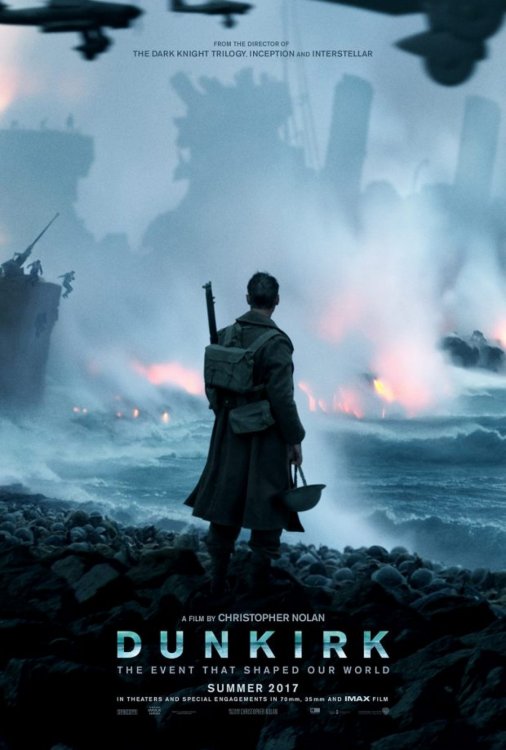
![]() Dunkirk is a Christopher Nolan film that branches off into a significantly different genre for the director, but remains quintessentially a Nolan film. For most people, that's enough to determine whether or not this film is for them. For the rest who might be on the fence over whether or not they'll like it, that's what this review is for.
Dunkirk is a Christopher Nolan film that branches off into a significantly different genre for the director, but remains quintessentially a Nolan film. For most people, that's enough to determine whether or not this film is for them. For the rest who might be on the fence over whether or not they'll like it, that's what this review is for.
First off, when I say that this is a Christopher Nolan film, that includes his non-linear editing. People going into this need to know that it isn't a traditional war movie and that it chooses to be a bit more artistic. There were several theatres to the conflict, which took place at different times, and Nolan took the areal, naval, and land battles and told them all at once. There were probably two reasons for this, the first being that this is Nolan's signature style, and the second being that what he dramatically wanted to achieve was to present the event in history as a single moment. The evacuation at Dunkirk, called Operation Dynamo in real life, feels like something that happened in a single day, and that everything happened all at once. Doing this increases the tension, and Nolan's goal was to take that one note and carry it out for as long as possible.
Because of that, this isn't necessarily a movie about story. There is a story, but it's very minimal. The point of the movie isn't necessarily to tell a complicated history report, but to make an experience. On that basis, Dunkirk succeeds in what it sets out to achieve. Now personally, I wish that it had done more to market itself as this. Plenty of people I know assumed that Nolan was trying his hand at a conventional war film. That tells me that the marketing team did not achieve what they were supposed to.
As a movie meant to be experienced, not told, it doesn't have particularly memorable characters. The battle is the main character, not any individual person. Nolan made the creative decision to treat them as faceless statistics that easily get lost in the masses. This deconstructs the idea that each soldier is "special" in the Hollywood sense. People have both liked and disliked this aspect of the movie. I personally feel both positive and negative towards this. On one hand, I want the soldiers to be humanized and presented in a way that I feel like I'm genuinely in their shoes. On the other hand, I understand the importance of not wanting to make this a movie about Hollywood heroism. That means that Harry Styles doesn't really get any moment to shine -- he was good in this film, by the way, and it isn't a bad start to an acting career. I mention that last bit because I just know that there are people to whom this Harry Styles business really matters. It should also be noted that all of the characters in the film, every last one, was fictional. They don't represent anyone specific, but rather a general idea of what people in their position went through. So again, you're not getting a story so much as a feel for the situation.
As a war movie, there are some shortcomings. It tells the standard "War is HeII" story, but doesn't really add anything to the genre that has gone to far greater extremes to make the point. Most famously, Coppola, Spielberg, and Gibson have made the grueling torture of war as explicit as possible. Less famously, there are directors like Verhoeven. A lot of these directors depict some true atrocities onscreen, but Nolan is known for staying reliably in the PG-13 area. There's no blood in this movie, and all of the deaths are in the background. It's much more tame.
In addition to the "War is HeII" narrative, it ends with a much more specific message that the soldiers who fled from Dunkirk felt that they weren't heroes and would be treated as failures when they got back home, only to be surprised when the British people celebrated their return and affirmed that they were indeed heroes. The theme was there throughout the movie, getting mentioned in brief moments. Some people will appreciate the subtlety, while others might find it annoying that the film doesn't spend more time to get the audience emotionally invested in the theme.
As a history film, there are things to like and dislike. Whenever I review anything based off of true events, it's important to mention accuracy. Some people have picked apart the historical inaccuracies, and a lot of them are nitpicks. For example, the German airplanes didn't have yellow noses until a month after the battle, and one of the cruisers used was French and dressed up to look British. There were legitimate reasons for those creative decisions, so I have no problem with those. Another criticism is that the story pays almost no attention to the French, which is just a matter of focus. I will say, if the film wasn't about capturing an experience and a moment, it would have had more time for that. There were some bigger problems that would disturb history buffs, namely that the actual town of Dunkirk, which Nolan shot on-location, was modern-day Dunkirk and not the giant pile of rubble that was 1940 Dunkirk. Almost all of the civilian ships used to evacuate the troops were not sailed by their owners, but commandeered by the government; the movie does acknowledge this though in a blink-and-you'll-miss-it moment that explains that Mark Rylance's character is one of the minority of shipowners who personally took part in the operation. The biggest historical discrepancy was that the film gives the impression that the civilian ships saved most of the troops, when actually they only picked up about a third of those evacuated.
Overall, Nolan does go to great lengths to make sure that he visually represents history very well. He looked at a great deal of photographs from the battle and tried to incorporate what he saw in those into the production, as well as his cinematography.
The cinematography bears special mentioning. Back in the day, I watched STAR WARS as a little kid when it was re-released in theatres, and ever since I've had a deep love of music and cinematography. I'll get to the music later, but for now, let's talk about the camerawork. I'm a major fan of Nolan's new cinematographer. Much has been made of Nolan's longstanding relationship with his previous cinematographer, Wally Pfister, but I've found that his new collaborations with Hoyte van Hoytema to be his first works truly notable for their visual beauty. Perhaps that's because he started collaborating with Hoytema immediately after his switch to consistently using IMAX cameras, which could very well be the case. Leading up to this film, as with Interstellar, Nolan made a big fuss about how he was using IMAX cameras and shooting on film. It's a little bit pretentious, but as it happens, I share his philosophy on this, and I completely agree that it improves the experience. The image quality is astounding. Being inspired by actual war photography, Hoytema is given some genuinely interesting things to capture. The lighting in every scene is astounding. It's been advertised to be like a virtual reality experience, and I can't argue with that. My favorite visuals of the film came from the areal dogfights, which looked really simple, but drew me in for how vast and spacious they were with IMAX film. Visually, my only wish is that there were a few shots that really showcased just how massive the operation was and gave us a better view of the boats as they arrived on the shores of France.
Musically, this film is less ambitious, although rather daring. It takes the basic premise of the Jaws theme and takes it up to eleven. With very few exceptions, the entire film is filled with tension-building ticking noises and high strings. Every scene is perpetually taught, like it's building up to something. The sound of the clock interestingly distorts time in this movie, since everything is shot out of order and yet rhythmically feels as though everything is happening simultaneously, in real-time. Creatively, I understand the decision, although I will disagree with people who say that it's a surefire win for an Academy Award. Although the music successfully manipulated the viewer to create the desired experience, its means were the definition of formulaic and Hans Zimmer in no way challenged himself.
The sound editing, interestingly, is one of Nolan's most controversial creative choices. It seems to me that a lot of people who liked this movie disliked the loud noises. He made a similar decision with his last film, and it's even more noticeable here. That is, he chose to make the dialogue hard to understand, to be true to real life. The average movie goers seems to dislike this, but this is a case where I actually agree with the snobby critics and the academy. This is good sound editing, and I wouldn't complain if it won an Academy Award. It made the film 3D without any sort of 3D gimmicks.
Overall, this is a film to be experienced, very much like his last film, Interstellar. It probably won't translate well to the small screen, so I suggest that if this is your thing, don't wait until then and go see it now.
24601



0 Comments
Recommended Comments
There are no comments to display.